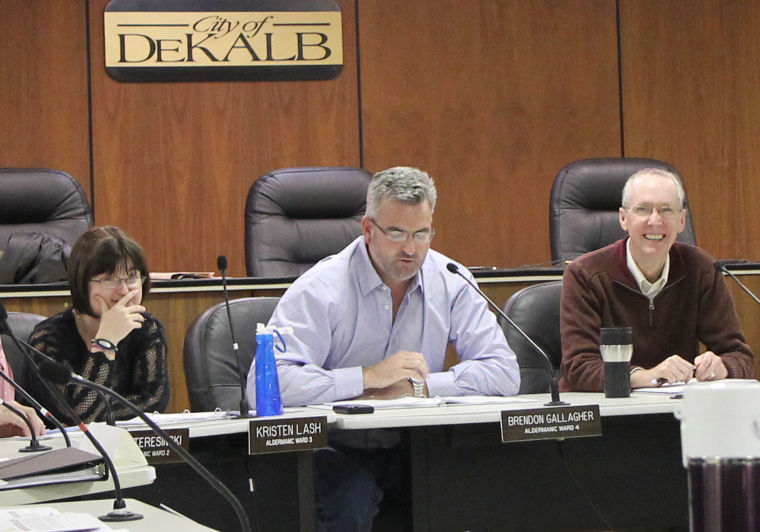City Council discusses Irongate annexation
Alderman Brendon Gallagher discusses the housing development study presented by the NIU Center for Governmental Studies at Tuesday night’s special city council meeting.
March 27, 2013
The Irongate annexation would likely benefit the city of DeKalb, according to some City Council members after reviewing a housing study at Tuesday night’s meeting.
The DeKalb Housing Information Project is a study created by NIU’s Center for Governmental Studies in order to provide a complete housing inventory of homes rented and owned in DeKalb. The study will serve as a tool in the decision-making process for implementing future housing projects, according to a presentation given by representatives from the Center for Governmental Studies.
According to the study, DeKalb may have an over supply of owned homes valued between $80,000 and $241,000, while there may be an under supply of owned homes valued at more than $242,000.
“We set a rule that households should not pay more than 30 percent [of their income on their mortgage],” said Kelley Chrisse, Center for Governmental Studies staff member. “That’s sort of the standard percentage at which households can afford the percentage that they pay of their income.”
The Irongate annexation, as noted in Monday night’s Council meeting, could help fill the under supply of homes valued at more than $242,000, said sixth ward alderman Dave Baker.
“We looked at ShoDeen’s development last night, not sure when it’s coming back,” Baker said. “But I saw that it appears we’re missing the homes that could be afforded by the income levels of the households that are actually living in DeKalb. If we’re definitely missing that, then we should be doing what we can to try to get that subdivision on the books and get it going.”
Fourth ward alderman Brendon Gallagher said that this study shows the need for changes in the housing in the city.
“This definitely shows we need new housing stock in conjunction with some of the older housing stocks,” Gallagher said.
Part of the study involved looking at the impact of students on DeKalb’s housing stock. Chrisse said students have a considerable impact on rental properties.
“Students have a huge impact on the rental stock,” Chrisse said. “And their ability to rent is often times not as consistent as what we’re setting the stage for in terms of 30 percent…. We came up with an estimate that approximately half of the renter households are likely student households.”
Second ward alderman Tom Teresinski said the study offers a perspective on how the university and the city affect one another in terms of policy making.
“I think the comment has been made numerous times throughout this evening and other discussions that there’s a direct implication and relationship that is impacted in the community with decisions that the university makes and vice versa,” Teresinski said. “The idea of having this whole analysis with the university, inclusive of housing and their policy decisions, is one of the core underlying aspects of this that I find extremely important to give us a view and visions of the future, how collectively working together we can deal with housing policy to affect these results. I see it as a big step forward.”
Local property managers Jim Mason and Mike Pittsley spoke to concerns about the housing study leaving out information and data in regard to the size of properties. The representatives from the Center for Governmental Studies said this was not something they looked into specifically because of difficulty getting information from some property owners, and they encourage the city to look further into the data presented.
“The research you deal with in the beginning always prompts another question and another element, another ally to pursue, to go down, to try to find out what the real answers are,” said Roger Dahlstrom, assistant director of the Center for Governmental Studies.
City manager Mark Biernacki commended the researchers on their work and said the study will be very useful to DeKalb in the future.
“This is an incredible piece of work,” Biernacki said. “I want to applaud the Center for Governmental Studies for their hard work…. It’s a very good piece for us to use.”
Gallagher agreed with Biernacki and said this data is a good starting point for the incoming council to use.
“I appreciate the hard work that you’ve done with this,” Gallagher said. “It’s an extremely difficult thing…. I think it gives an extremely good start for where the next council’s going to go, with the new make up of the new council as far as what we want to do and what we want to see.”







